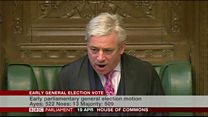
Campaigning is under way after the House of Commons backed Theresa May’s call for a general election on 8 June.
MPs voted by 522 votes to 13 – with Labour and Lib Dem helping secure the two-thirds majority needed to bring forward the election from 2020.
The prime minister urged voters to give her “the mandate to speak for Britain and to deliver for Britain”.
Jeremy Corbyn said a Labour government would stop Mrs May from using Brexit to make the UK an “offshore tax haven”.
Speaking in Croydon on his first campaign stop, the Labour leader said if elected, he would raise the minimum wage to £10 an hour and increase spending on the NHS, social care and council housing.
The BBC’s political editor Laura Kuenssberg said sources suggested Mr Corbyn wanted to frame the election as being about the delivery of public services, and the kind of economy the UK will have after Brexit.
Jeremy Corbyn began Labour’s election campaign in Croydon
She said she understood that Mr Corbyn had ruled out “progressive alliances” with other parties, such as the Greens, as a way of thwarting Conservative attempts to increase their majority.
The Labour leader confirmed there would be no coalition deal between his party and the SNP.
In other election developments:
- The PM says she will not take part in TV leaders’ debates
- George Osborne is to quit as an MP but Ken Clarke plans to stand again
- The Manchester Gorton by-election is set to be cancelled with the poll moved to 8 June
- Labour suggests people earning £70,000 a year could be asked to pay more tax
- Scottish party leaders make their opening pitches
- The Democratic and Ulster Unionist Parties are to hold talks about a pact
The next general election had been expected in 2020, but the Fixed Term Parliaments Act allows for one to be held earlier if it has the support of two-thirds of MPs. The Commons backed holding a poll in 50 days time by a majority of 509.
Defending the move, Mrs May told MPs there was a “window of opportunity” to hold a poll before Brexit negotiations began in earnest in June.
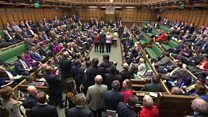
The prime minister is hoping to significantly boost her current Commons majority of 17 to increase her authority, ahead of 18 months of talks which will determine the manner of the UK’s exit from the EU.
Mrs May, who became PM last July after the EU referendum, told MPs that it would be wrong for the UK to find itself reaching the most “difficult and sensitive” phase of Brexit negotiations in late 2018 and early 2019 at a time when a general election was “looming on the horizon”.
During a special Commons debate, she said it was the “right and responsible” thing to do hold the election now to help the UK prepare for life outside the EU.
The PM sets out her stall
BBC political editor Laura Kuenssberg
Image copyright
AFP/Getty
What will you hear a lot of from the Tory leader? Well if her very first campaign visit is anything to go by, David Cameron and George Osborne’s “long-term economic plan” mantra will be replaced by the phrase “strong and stable”.
On the stump you’d be forgiven for losing count of the number of times she used the phrase. One totting-up puts it at 13 mentions.
Brexit has undoubtedly set the backdrop for this election, and provided the catalyst for its timing. But the Conservatives plan to win to deliver their version of Brexit by again and again comparing what they claim is the “strong and stable” leadership provided by the sitting prime minister, and the alternative put forward by Jeremy Corbyn.
Tomorrow he’ll make his first big election speech, his first big chance to recast that argument.
Speaking later, on her first campaign speech in Bolton, Mrs May contrasted the “strong and stable leadership” she could provide with what she warned would be a “coalition of chaos” if Jeremy Corbyn was elected.
The Lib Dems, she said, were willing to “prop up” Labour, while she warned the SNP’s “tunnel vision” over Scottish independence risked destabilising the country.
- Voters guide: what you need to know
- Which MPs are going and which are staying
- World’s media react to snap poll
The SNP, whose MPs abstained in Wednesday’s vote, has accused Mrs May of political opportunism and said only it stands in the way of a “hard-line” Tory government.
Nine Labour MPs opposed the snap election as did three independents and the SDLP’s Alasdair McDonnell.
Although Parliament will not be officially dissolved until early May, campaigning is already under way – with Lib Dem leader Tim Farron addressing a rally of activists in south-west London earlier on Wednesday.
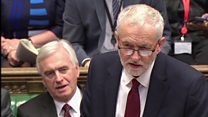
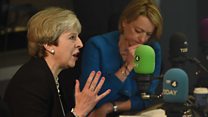
Mrs May has said she will not take part in any TV leaders’ debates, leading to criticism from Mr Corbyn and other party leaders that she is “running scared”.
As the Commons backed the General Election – which will be held just over two years after the Conservatives won a narrow victory in the May 2015 poll – senior politicians from all parties have been clarifying their intentions.
Former Conservative chancellor George Osborne said he would not be standing again in Tatton in order to concentrate on his job as editor of the Evening Standard, although he hinted at a possible return to frontline politics in the future.
Also standing down is Labour MP Gisela Stuart, who chaired the winning Vote Leave campaign in last year’s referendum.
But former Lib Dem deputy prime minister Nick Clegg has said he will stand in Sheffield Hallam, and Conservative grandee Ken Clarke will again contest Rushcliffe, a seat he has represented since 1970. He had previously said he intended to stand down in 2020.
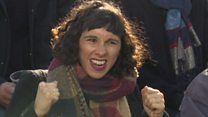
Meanwhile, Labour’s ruling National Executive Committee has confirmed that existing MPs who wish to stand again will be automatically selected and that any unsuccessful candidates from 2015 will be asked to put themselves forward.
The NEC will directly fill any vacancies in England triggered by retirements while the parties in Scotland and Wales will handle their own procedures.
In a statement, it said it regretted that local parties in England would not be able to select candidates as normal but it would be “simply impossible to hold trigger ballots, selection hustings and meetings in the 631 Parliamentary constituencies” before the 11 May deadline for nominations.
Sign-up to get news from the BBC in your inbox, each weekday morning
MPs back May’s call for snap UK election

